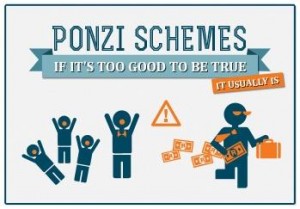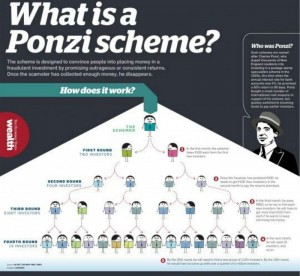This blog post written by Saanvi Singla, a student of University Institute of Legal Studies, Panjab University provides a basic understanding of Ponzi schemes and the legal infrastructure that prevents such schemes.
What is a Ponzi Scheme?
A Ponzi scheme is a type of scam designed to cheat the investors out of their hard-earned money. It has been named after Charles Ponzi, who created such a scheme at the start of the 20th century, though the concept was quite well-known before it was called a Ponzi scheme.
The scheme is constructed to convince the public to invest their money in a fraudulent scheme, investment or plan. Once the person who is committing the scam feels that enough money has been collected, he disappears—taking with him all the money.
Five Key Elements of a Ponzi Scheme
There five key elements which have been found in almost all Ponzi Schemes include:
- The Benefit: A promise is made that the investment will give an above normal rate of return. The rate of return is usually specified. The promised rate of return has to be high enough so that the investor is interested enough but it should not be so high that the investor grows skeptic.
- The Setup: A comparably plausible explanation is given as to how the investment can achieve such abnormal rates of return. One of the most often used explanations is that the investor is exceptionally skilled, and he/she has some inside information. Another possible explanation can be that the organizer has access to an investment opportunity which is not available to the general public.
- Initial Credibility: The person running the scheme needs to earn the trust of the investor so that the investor trusts him enough to invest more in his scheme.
- Initial Investors Paid Off: For the first few months, the investor has to be paid the promised rate of return to make the scheme believable.
- Communicated Successes: They have to communicate about their success. Other investors need to hear about the payoffs so that their numbers grow at an exponential rate. At the very least, more money than what is being paid back to the investors during the initial months needs to come into the account.
How Do Ponzi Schemes Work?
Ponzi Schemes are quite basic and simple in nature but can prove to be extraordinarily powerful. The steps which are followed are as follows:
- Convince people to place their money into the investment.
- Until a specified time return the money to the investors with the promised interest rate or return.
- Showing the phenomenal success of the investment, convince more investors to invest their money into the system for higher returns. Typically a vast majority of the earlier investors will return. Why won’t they? The system has been giving them excellent returns.
- Keep on repeating steps 1 through 3 for a couple of times. During step 2 at one of the cycles, break the pattern. Instead of returning the invested money to the investors and paying the promised return, escape with the said money and start a new life.
How Big Can Ponzi Schemes Get?
Ponzi schemes can turn into billions of dollars scam. In 2008 during the global meltdown, we saw the fall of agreeably the largest Ponzi scheme in history – Bernard L. Madoff Investment Securities LLC. The scheme had all the necessary ingredients of a classic Ponzi scheme, including the founder, Bernard L. Madoff, had a great deal of credibility in the market as he had been in the investment business since 1960. Madoff was also the chairperson of the board of directors of NASDAQ, a major American stock exchange, for some time. The estimated loss from this Ponzi scheme is believed to be in between 34 and 50 billion U.S. dollars.[1]
Warning Signs of a Ponzi Scheme
There are various signs through which a Ponzi scheme can be identified. Some of them include:
- The rate of return is suspiciously high (maybe as high as 10% per month or 120% per year) – but this is not always the case. It can also be the usual rate of return.
- The person who tries to recruit you into the scheme usually is someone you think is trustworthy, like a neighbor or friend or sometimes even a relative.[2]
- Investment values tend to go up and down all the time, especially those who offer potentially high returns. Be suspicious of an investment that continues to give regular, positive returns despite the overall market conditions.
- Ponzi schemes are not registered with any government regulatory body. Registration is very important because it provides investors with all the important information about the company’s management, products, services, and finances.
- Avoid investing in plans you do not understand, or for which you cannot get complete information.
- Do not accept any excuses as to why you cannot review information about the investment in writing.
- Be suspicious if you do not receive any payment or have difficulty in cashing out your investment. Keep in mind that Ponzi scheme promoters would encourage participants to “roll over” the investments and sometimes promise to return offering at a rate which is even higher than the promised return rate.[3]
Laws related to Ponzi Scheme
The words ‘Ponzi Scheme’ have clearly not been mentioned in any act or guideline in India. Mostly it has been referenced to indirectly. The Reserve Bank of India (RBI) does not mention or own up about the problem of a Ponzi scheme. According to them, it does not come under their purview. Due to this reason, they have not issued any guidelines for the same.
Securities Laws (Amendment) Act, 2014 is the only legislation which has been made to deal with the problem of Ponzi schemes. This act can into the picture due to the Saradha scam. It is legislation which provides the Securities and Exchange Board of India (SEBI) with the power to pursue fraudulent investment schemes with a special emphasis on Ponzi schemes.
How to Save Yourself from a Ponzi Scheme
There are many ways through which a person can save himself/herself from a Ponzi scheme. Some of the ways have been mentioned below.
- Use Your Common Sense. If it sounds too good to be true, it probably is. An investment opportunity can easily be made to look like a sure thing, but investors should always think logically rather than emotionally. Recognized and true companies in most investments schemes will not offer an assured return. Guarantees of high percentages like 15 to 20 percent annually are impractical because markets fluctuate. If an investment manager suggests you’ll get these types of returns, then you should be skeptical.
- Choose Wisely. Choose your investment manager with the same caution with which you chooses your attorney or accountant. Experience and skill should be the main consideration points rather than personality or charisma. Most Ponzi schemes are organized by excellent sales persons with a remarkable personal resume but, apparently, with a lack of professional ethics. Look into the professional accreditation and whether any complaint has been filed against the firm or individuals involved.
- Ask Questions. Don’t be afraid or shy to ask your investment manager tough or tricky questions, such as “What exactly am I investing in?” or “Who is your auditor?” Genuine investment firms use very well-established and reputed auditing firms. Dishonest firms deliberately choose small, mysterious firms that can easily be influenced.
- Demand Detailed Reports. Most executioners of Ponzi schemes send periodic reports to investors with very limited amount information. This is a major red flag. Honest and true investment firms provide very detailed professionally prepared reports on a very regular basis which can range from a monthly or a quarterly or an annual report or all three. Reports should include clear details of all the changes that have taken place regarding your assets—whether you’ve earned or lost money—and most of them will tell you where your assets have been invested. Ponzi schemes thrive because their victims trust them enough to ignore the lack of proper documentation.
- Be Patient. The promise of significant wealth gain via a successful investment is very appealing, but investing should be an intellectual process, rather than an emotional one. Be a little skeptical. Think more about what all can go wrong than what all can go right. Deal with established and reputed investment managers only. Ask tough questions about where your money is going to be invested. Demand regular and detailed reporting. Before making any significant investment, consult your accountant or attorney or a specialist in that particular field and take a decision wisely.[4]
Conclusion
In this article, we understand what a Ponzi scheme is and how dangerous it can prove to be for the common man. We identify all the laws that are present in our country to extinguish these schemes. After getting a proper understanding of the topic, we can conclude that India needs to consider the problem of Ponzi schemes much more seriously and should make proper laws for the same. After the Saradha scam, the government should have learned their lesson and should now move towards the goal of preventing such occurrences in the future.
[divider]
Footnotes:
[1] http://economics.about.com/od/financialmarkets/f/ponzi_scheme.htm
[2] https://www.moneysmart.gov.au/scams/investment-scams/ponzi-schemes
[3] https://www.sec.gov/answers/ponzi.htm
[4] http://stonebridgebp.com/library/fraud-forensics/protect-yourself-dont-be-a-victim-of-a-ponzi-scheme
 Serato DJ Crack 2025Serato DJ PRO Crack
Serato DJ Crack 2025Serato DJ PRO Crack









 Allow notifications
Allow notifications


